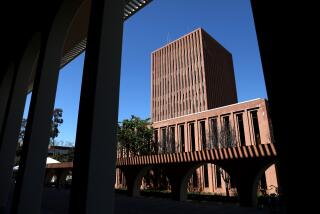United Education Learns Profitable Lesson in Its Trade Schools
- Share via
It was a $3-million lesson, but Aaron Cohen seems to have finally learned to stick to what he does best.
Three years ago Cohen, president of Encino-based United Education and Software, made a disastrous foray into the computer business. Since then, Cohen has gone back to emphasizing the company’s less glamorous trade and technical schools, where it makes steady profits teaching people welding, car mechanics, nursing, computer operations and other skills.
The lesson is beginning to pay off. United Education went from a $2.9-million loss for the fiscal year ended Jan. 31, 1985, to a $1.2-million profit for fiscal 1986. And for the nine months ended last Oct. 31, the upswing continued as its profits increased 53% to $1.3 million on a 41% increase in revenue to $23.6 million.
Now Cohen is leading the company into its biggest expansion yet. Last month, United Education bought, from Airco Education Services of Montvale, N.J., 10 technical schools--three aircraft maintenance schools in Colorado, Wyoming and Texas and seven welding schools in scattered locations across the country.
The acquisition gives United Education 24 trade schools in nine states and makes it one of the nation’s 10 largest technical school operators.
Firm to Nearly Double
The deal will also nearly double United Education’s size. Cohen expects annual revenue to climb from about $36 million in the year ended Jan. 31 to $65 million next year.
The acquisition was made for an undisclosed amount of cash, and the company has not said how it will be financed. Industry sources say United Education probably paid around $15 million.
Analyst Michael Adkins, who follows United Education for Fechtor, Detwiler & Co. in Boston, said the deal was a good one because United Education is adept at making money in the schools business.
“Now they’ve cleaned up the problems that were caused by their entry into the computer business and are back in the school business with a vengeance,” Adkins said.
Unfortunately for Cohen, who owns about 10% of the company’s stock worth $2.3 million, investors have not taken much notice yet. United Education’s stock, which closed Friday in over-the-counter trading at $7.75 bid, although up 30% from a year ago, still trades at an unusually low price.
With a little more than 3 million shares of United Education outstanding, Adkins said, the total market value of the stock is barely more than half its annual revenue. Most companies in the schools business, he said, trade much closer to their annual revenue figures.
The problem, said industry executives, is that investors often do not fully understand the nature of the trade school business.
“The balance sheets are soft because these aren’t asset-type companies. A lot of the equipment is rented and the buildings are leased,” said Michael R. McKinney, president and chief executive of Careercom Corp., a school operator based in King of Prussia, Pa.
Adkins said investors may also be reluctant to buy United Education’s stock because the recent schools acquisition is so big, or because they have not forgotten the company’s prior problems.
Those troubles began in 1983 when United Education bought a computer firm in Sioux Falls, S.D., hoping to develop personal computer systems and software to sell to vocational schools. The company bought considerable computer hardware, only to end up with $1 million worth of IBM personal computers it could not sell, thanks to an industrywide glut.
The company still operates a scaled-down computer software operation in South Dakota, which Cohen said is profitable now.
In addition to operating schools, United Education also administers student loans for schools and financial institutions, which accounts for about 22% of its revenue.
Publicly Held Firm
United Education became a publicly held company in 1982 when its stock was spun off from National Technical Systems, a defense testing firm in Calabasas. National Technical was the successor company to an engineering test firm Cohen formed in 1961 with his partner Jack Lin, now National Technical’s president and chief executive.
The technical school business historically has thrived during recessions when unemployed workers want training to find new jobs. But the business has continued to grow steadily since the last recession five years ago, in part because demand continues for workers trained in computer services. Also, there is a market for retrained workers as companies automate plants.
One area of concern is that student aid programs may be cut as part of government budget reductions. Most students who attend trade and technical schools receive some kind of aid, particularly student loans guaranteed by the federal government. About 90% of United Education’s 15,000 students, who pay tuition ranging from $2,000 to $7,000 a year, receive some aid.
Impact Studied
“The most recent (budget) proposals we don’t think will have a significant effect,” said R. David Bright, president and chief executive of Newport Beach-based, National Education Corp., the largest company specializing in trade and technical schools. Bright adds that the cuts have affected higher income students receiving aid rather than ones who typically attend technical schools.
Cohen believes he got a good deal with his 10 new schools, although two of them, in Philadelphia and Baltimore, have problems and need management changes.
Overall, it was a bargain deal, Cohen said. It cost United Education half of what it would have cost to start the schools from scratch. All the more reason he plans to keep shopping for schools instead of computers. UNITED EDUCATION & SOFTWARE AT A GLANCE United Education & Software owns 24 technical schools that teach such subjects as welding, nursing, auto repair, court reporting and computer programming. The company has more than 1,200 employees.
More to Read
Inside the business of entertainment
The Wide Shot brings you news, analysis and insights on everything from streaming wars to production — and what it all means for the future.
You may occasionally receive promotional content from the Los Angeles Times.








